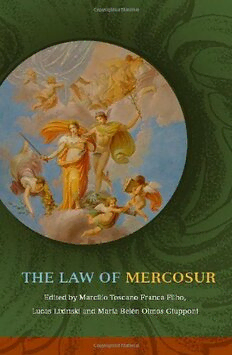Download The Law of MERCOSUR PDF Free - Full Version
Download The Law of MERCOSUR by Marcilio Franca Filho, Lucas Lixinski, Maria Olmos Giupponi in PDF format completely FREE. No registration required, no payment needed. Get instant access to this valuable resource on PDFdrive.to!
About The Law of MERCOSUR
MERCOSUR (in Spanish: Mercado Com??n del Sur / in English: Southern Common Market) is a regional trade agreement among Argentina, Brazil, Paraguay, and Uruguay. Founded in 1991 by the Treaty of Asunci??n, which was later amended and updated by the 1994 Treaty of Ouro Preto, MERCOSUR's purpose is to promote free trade and the fluid movement of goods, people, and currency. Bolivia, Chile, Columbia, Ecuador, and Peru currently have associate member status. This book presents both an overview and in-depth analysis of MERCOSUR - one of the world's most important and increasingly influential economic organizations. The book is comprised of two types of chapters. The first, a series of first-hand analysis of the treaty by experts from countries in the MERCOSUR bloc and, the second, a series of discussions from other parts of the world looking at MERCOSUR as global actor of ever increasing importance. The book divides the analysis into three main parts. The first section contains the key institutional legal aspects of MERCOSUR, looking at its history, the general theory of economic integration, and basic aspects relating to the functioning of MERCOSUR. The second section examines specialized topics, such as the regulation of telecommunications in MERCOSUR, the environment, human rights, the energy market, etc. The final section - in which the editors offer a translation of core MERCOSUR instruments - provides further understanding of the economic bloc. Original in its conception, the book covers a major gap in English-language literature by offering a comprehensive and in-depth analysis of the law of MERCOSUR. It will become essential reading for both practitioners and academics interested not only in MERCOSUR, but in economic integration, international trade, and regional aspects of the phenomenon of globalization.
Detailed Information
| Author: | Marcilio Franca Filho, Lucas Lixinski, Maria Olmos Giupponi |
|---|---|
| Publication Year: | 2010 |
| ISBN: | 9781841139432 |
| Pages: | 505 |
| Language: | English |
| File Size: | 2.347 |
| Format: | |
| Price: | FREE |
Safe & Secure Download - No registration required
Why Choose PDFdrive for Your Free The Law of MERCOSUR Download?
- 100% Free: No hidden fees or subscriptions required for one book every day.
- No Registration: Immediate access is available without creating accounts for one book every day.
- Safe and Secure: Clean downloads without malware or viruses
- Multiple Formats: PDF, MOBI, Mpub,... optimized for all devices
- Educational Resource: Supporting knowledge sharing and learning
Frequently Asked Questions
Is it really free to download The Law of MERCOSUR PDF?
Yes, on https://PDFdrive.to you can download The Law of MERCOSUR by Marcilio Franca Filho, Lucas Lixinski, Maria Olmos Giupponi completely free. We don't require any payment, subscription, or registration to access this PDF file. For 3 books every day.
How can I read The Law of MERCOSUR on my mobile device?
After downloading The Law of MERCOSUR PDF, you can open it with any PDF reader app on your phone or tablet. We recommend using Adobe Acrobat Reader, Apple Books, or Google Play Books for the best reading experience.
Is this the full version of The Law of MERCOSUR?
Yes, this is the complete PDF version of The Law of MERCOSUR by Marcilio Franca Filho, Lucas Lixinski, Maria Olmos Giupponi. You will be able to read the entire content as in the printed version without missing any pages.
Is it legal to download The Law of MERCOSUR PDF for free?
https://PDFdrive.to provides links to free educational resources available online. We do not store any files on our servers. Please be aware of copyright laws in your country before downloading.
The materials shared are intended for research, educational, and personal use in accordance with fair use principles.

